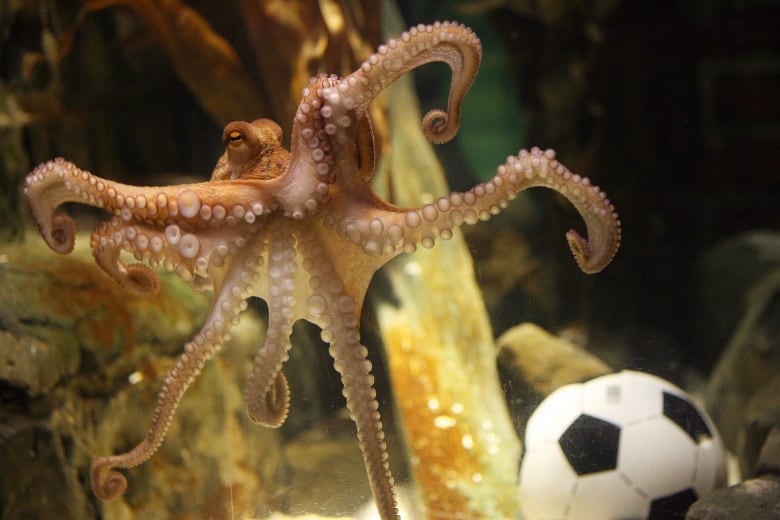The cephalopod’s nervous system diverged in many unexpected ways compared to humans.

Everything about the octopus seems strange — unworldly, even, as some have suggested — compared to other life forms on Earth.
Their evolutionary history is thought to go back 330 million years, far longer than mammals, and they’re so alien-like, they could be considered as a potential model for how intelligent alien creatures may have very different ways of thinking from us.
The octopus has a reputation as a very intelligent animal, able to solve puzzles, open jars and use tools. They are masters of camouflage and proficient escape artists. Their unique soft bodies with eight incredibly flexible arms enable them to crawl over rough terrain or use jet propulsion to quickly escape from predators.
As you will hear on this week’s episode of Quirks & Quarks, these amazing animals also have the ability to massively change their genetic material in real time to adapt their bodies to different environmental conditions. They do wholesale editing of their RNA to produce proteins best suited to work as the ambient temperature changes around them.

Even the octopus brain is different in that it is not all contained in the animal’s head. Two thirds of their nervous system is distributed through each of the eight arms. Their arms are covered in suction cups that contain thousands of sensors for touch and taste that are processed by these neurons, so each arm is working somewhat independently.
This distributed brain nervous system suggests that the octopus, as an intelligent being, takes a different approach to understanding the world than we do.

Science fiction often portrays aliens as variations on the human form with two arms, two legs and one head with unusual facial features. And conveniently, they often speak English. Any fictional creatures that look like insects or amorphous blobs are usually violent aggressors that need to be eliminated.
How will we react if we meet super intelligent aliens who look and think like octopuses?
Alternatively, how will they react when they see our strange looking bodies, if they have eyes?

Communicating with intelligent aliens will be an enormous challenge as we both attempt to understand each other. For example, the octopus — and its relative the cuttlefish — can change colour quickly for camouflage and possibly for communicating with each other. Will we be able to translate a language that is based on colour, and learn to speak it ourselves?
Diving on a coral reef, floating weightless above the incredible variety of marine life, is the closest we can come to visiting an alien world here on Earth.
Creatures appear in so many different forms: sea anemones that look like plants, multi-legged crabs, eels, spiny lobsters, colourful damsel fish and octopus — all surviving in different ways. It is reasonable to believe that variety will continue on other planets in our galaxy.
Sadly, our relationship with sea creatures on this planet has mostly been to hunt and eat them, while destroying their habitat with pollution, ocean acidification and coral bleaching.
And in movies, most alien encounters involve wars of some kind. Hopefully, that won’t happen when we make contact with an alien species.
The Search for Extraterrestrial Intelligence (SETI) Institute is part of a decades-long effort that has yet to find any positive signs that anyone is out there. But the universe is a big place. And if we ever encounter extraterrestrials, it’s unlikely the aliens will look or think like us.
Our biggest challenge will be communicating with a highly intelligent civilization that might reach out with eight arms to say hello.
ABOUT THE AUTHOR
Bob McDonald is the host of CBC Radio’s award-winning weekly science program, Quirks & Quarks. He is also a science commentator for CBC News Network and CBC-TV’s The National. He has received 12 honorary degrees and is an Officer of the Order of Canada.
*****
Credit belongs to : www.cbc.ca
 Atin Ito First Filipino Community Newspaper in Ontario
Atin Ito First Filipino Community Newspaper in Ontario







